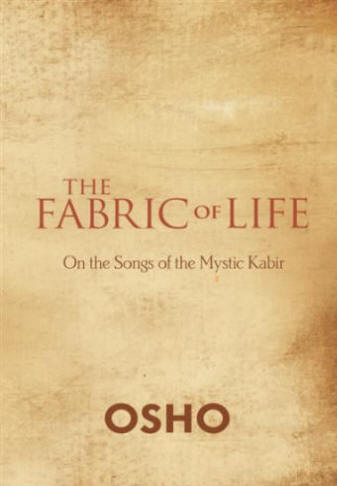
On the Songs of Kabir
Kabir was a 15th century mystic and weaver. Taking his songs as a starting point, Osho shares insights into such questions as love, the implications of money, how people communicate with each other, the longing for personal freedom, and finding happiness beyond our desires. All these are issues woven into the fabric of life.
Osho Kundalini Meditation
The book also introduces and explains in detail the workings of the OSHO Kundalini Meditation, which – when done rightly – helps “your whole energy to be ecstatic and move upwards into joy and bliss.”
“The fabric, the cloth of life, is very fine. And the more you are able to see how fine it is, the more you will be able to recognize the subtlety of its making, the more you will be filled with gratitude, the more you will find the treasure invaluable.” Osho
Kabir is very simple
“Kabir is unique. He gives hope to everyone – it is difficult to find a more ordinary person than Kabir. If Kabir can reach, then everyone can. Kabir is an utterly simple man; so even a simple-hearted person can have hope. Kabir is illiterate, which shows that being educated has nothing to do with truth. There is no way to know what caste or community he belonged to – maybe he was born into a Muslim family and was raised in a Hindu family. So caste and community have nothing to do with godliness.
Kabir didn’t renounce Anything
“Kabir lived as a householder. He was a weaver by profession, and so he would weave clothes and sell them in the marketplace. He never left home to go to the Himalayas. Godliness can be realized even at home, there is no need to go to the Himalayas. Kabir did not renounce anything – yet he found everything. So, leaving something behind cannot be a precondition for achieving. There is no precondition that you have to leave something behind in order to achieve something.
“There is nothing extraordinary about Kabir’s life. To be extraordinary may be an embellishment for the ego, but it cannot reflect the beauty of one’s being. Kabir is not rich, neither is he knowledgeable, respected, educated or highly cultured. If a person like Kabir can attain the ultimate, there is no reason why you should be disappointed. Hence, Kabir gives much hope.” Osho
On the Songs of the Mystic Kabir
In het boek The Fabric of Life geeft Osho commentaar op de songs van Kabir. Osho heeft een aantal boeken aan de mysticus Kabir gewijd die zijn boodschap vooral via liederen naar buiten bracht. Op die manier, via songs, gaf Kabir  uiting aan zijn verwondering over het bestaan en zijn inzichten erin. Ze zijn heel indringend in hun eenvoud. The Fabric of Life is pas veel later uit het Hindi in het Engels vertaald
uiting aan zijn verwondering over het bestaan en zijn inzichten erin. Ze zijn heel indringend in hun eenvoud. The Fabric of Life is pas veel later uit het Hindi in het Engels vertaald
Kabir was een eenvoudige handwerksman, een wever. Op de cover van het boek zie je een weefsel weergegeven, heel beeldend. “De stof van het leven zoals die geweven is,” zegt Osho “is een hele verfijnde.” “Als je de subtiliteit ervan gaat herkennen, zul je vervuld raken van dankbaarheid.” zo geeft hij aan.
In het boek gaat Osho o.a. in op vragen over: het verlangen naar persoonlijke vrijheid, de wijze waarop mensen communiceren, het geluk dat voorbij het verlangen ligt. Ook vertelt hij in detail over het ontstaan en het effect van de Osho Kundalini meditatie, een zeer interessant onderdeel.
Het boek The Fabric of Life is verkrijgbaar bij de Boekhandel of via internet.
Fragment of the Fabric of Life
“Kabir is unique. He gives hope to everyone – it is difficult to find a more ordinary person than Kabir. If Kabir can reach, then everyone can. Kabir is an utterly simple man; so even a simple-hearted person can have hope. Kabir is illiterate, which shows that being educated has nothing to do with truth. There is no way to know what caste or community he belonged to – maybe he was born into a Muslim family and was raised in a Hindu family. So caste and community have nothing to do with godliness.
Kabir lived as a householder. He was a weaver by profession, and so he would weave clothes and sell them in the marketplace. He never left home to go to the Himalayas. Godliness can be realized even at home, there is no need to go to the Himalayas. Kabir did not renounce anything – yet he found everything. So, leaving something behind cannot be a precondition for achieving. There is no precondition that you have to leave something behind in order to achieve something.
There is nothing extraordinary about Kabir’s life. To be extraordinary may be an embellishment for the ego, but it cannot reflect the beauty of one’s being. Kabir is not rich, neither is he knowledgeable, respected, educated or highly cultured. If a person like Kabir can attain the ultimate, there is no reason why you should be disappointed. Hence, Kabir gives much hope.” Osho